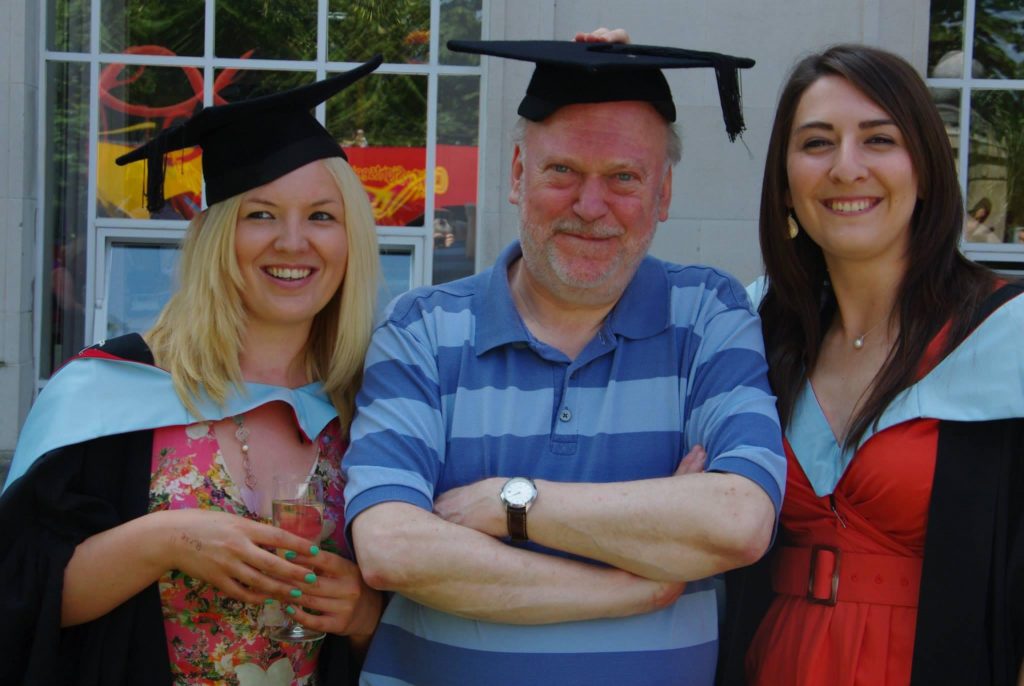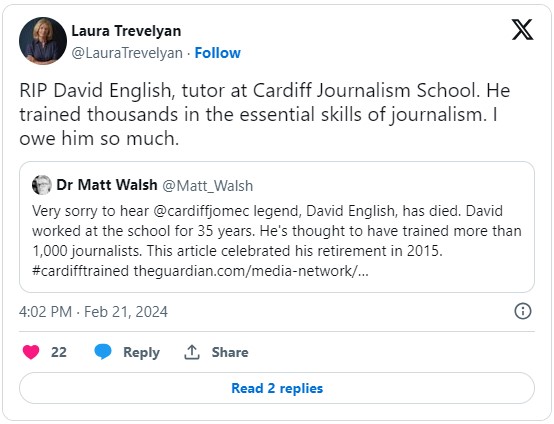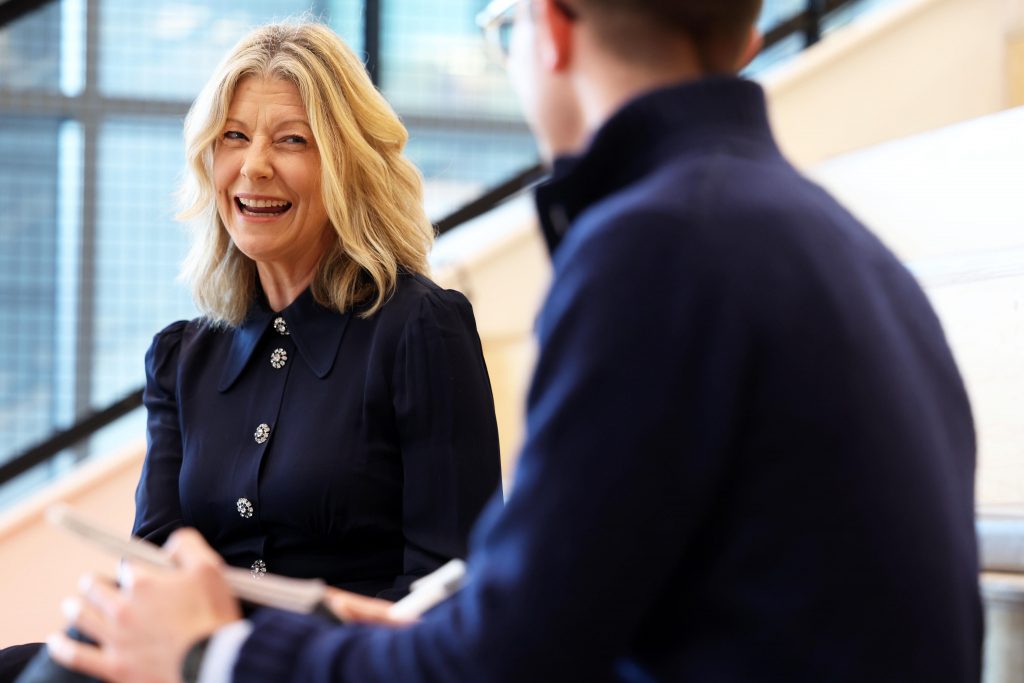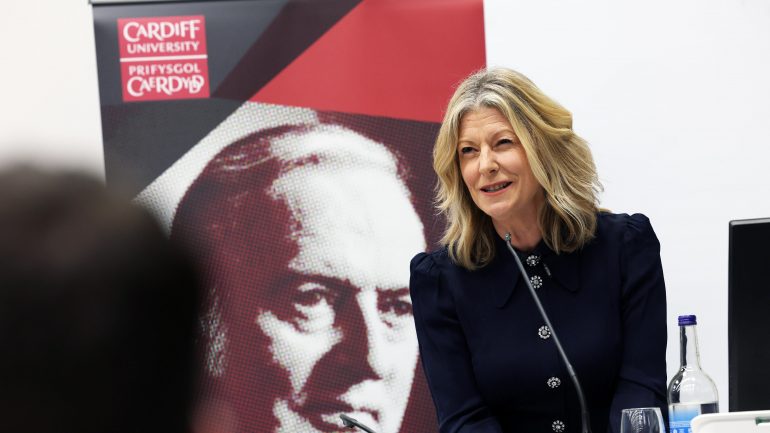The former BBC journalist paid tribute to her tutor David English during a lecture on the importance of reparations
BROADCASTER Laura Trevelyan paid tribute to her journalism tutor when she returned to lecture at Cardiff University where she trained.
Her topic was her family’s advocacy of reparations after discovering their links to slavery, and how the injustice of climate change threatens the Caribbean today.
But she began the inaugural Sir Tom Hopkinson lecture at Cardiff University School of Journalism by underlining the traditional standards of journalism that David English, who died in February, held so dear.
The former BBC journalist agreed with Mr English, who told The Guardian in 2015 the fundamentals of journalism had not changed since the days when she was on her postgraduate training course.

Holding fast to the traditional standards of evidence-based reporting and checking sources in a changing media landscape is vital, she said.
“David was my tutor back in 1990 – when we had typewriters and learned shorthand and how to type at 100 words a minute. A more exacting yet encouraging figure than David would be hard to find,” she said.
Mr English’s influence on Ms Trevelyan’s life was profound. She used the skills he taught her throughout her 30-year career at the BBC.
“The freedom of the press is vital to a functioning society, in the ability of the press to hold those in power to account on behalf of the public. There is no more vital role in a democracy,” she said.

Disinformation in a volatile media landscape
Ms Trevelyan said journalism was unrecognisable from when she entered the industry in 1991, partly due to the rise of disinformation which has made the media landscape more volatile.
This makes the values that David English taught her and a thousand other students more important than ever.
“What you want is for the information to fight through the disinformation, and that’s now the role of the journalist.”
“The question is whether people will get bored of this model of being told stuff that they want to hear that is not necessarily true.”
Laura Trevelyan
Ms Trevelyan said disinformation had risen because “it is quite liberating and exciting to begin with – the sort of kick over the traces [and] two-fingers to you” kind of journalism. However, she wonders if it might peak in 2024.
“The question is whether people will get bored of this model of being told stuff that they want to hear that is not necessarily true,” said Ms Trevelyan.
Storytelling in slavery reparations
The main topic of the lecture was her family’s links to slavery. They are descendants of Sir Charles Trevelyan, the 19th century British civil servant and colonial administrator, who owned a slave plantation in the Caribbean island of Grenada.
In 2023 the family publicly apologised for its ownership of more than 1,000 enslaved Africans in Grenada and promised to pay reparations.
Her experience as a journalist has helped her work as a slave trade reparations advocate. Ms Trevelyan made a documentary for the BBC called Confronting the Past in 2022.
“People said there would be something powerful in setting a public example. To me, there is a clear link to storytelling and public service,” said Ms Trevelyan.
“The importance of setting an example is the hope that then perhaps others might follow.”
The Trevelyan family was guided by what Grenadians said they would like them to do. They started with an apology which is also the first point on The Caribbean 10 point reparations plan.
“The importance of setting an example in the hope that then perhaps others might follow.”
Laura Trevelyan
The Trevelyan family got a compensation payout from the British government when slavery was abolished in 1834. This compensation led to the wealth inequalities which still exist 200 years later.
The family are now addressing the wealth gap between Grenada and the Trevelyan family by donating, and advocating through storytelling such as the BBC documentary.
However, Ms Trevelyan said the injustice of the slave trade 200 years ago is not only apparent in the wealth gap.
Health issues are a legacy of this injustice. The Grenadian national dish Oil Down was made by slaves and contained whatever they could find, such as salted fish, pig’s feet, breadfruit and coconut milk. It is very high in salt and sugar.
Ms Trevelyan said: “In Grenada there is an epidemic of obesity, of hypertension and of diabetes which is linked to poor diet from the period of slavery.”

Climate crisis is the latest inequality
Ms Trevelyan said reparation was not just about trying to repair past injustices but also those in the present. One of the biggest threats to the Caribbean is climate change.
Ms Trevelyan believes the British government should invest in green energy in the Caribbean.
“To me there is a clear reparatory element to climate resiliency funding,” she said.
At COP28 in October 2023, a Loss and Damage fund was set up to help countries at the frontline of climate change – such as low-lying Caribbean islands – which are facing rising sea levels and more intense hurricanes.
Loss and Damage calls on the world’s richer nations, like the UK – which historically are the perpetrators of climate change – to help poorer nations cope with adapting to climate change, through building disaster-resilient infrastructure and investing in green energy alternatives to fossil fuels in the Caribbean.
Ms Trevelyan is pleased discussions have begun but said more needs to be done. She believes the history of slavery and present-day injustices, like climate injustice, are woven together.
“The industrial revolution which helped Britain come to prominence as a developed economic power, the money that fueled that was funded by slavery.
“You have the double injustice: one, the Transatlantic slave trade and two, the fact that the industrial revolution led to the polluting of the Caribbean and other places by the colonial powers.”
If there were to be a climate disaster, like a hurricane in the area, the Caribbean islands would need to borrow money to solve the emergency which would further their indebtedness.
“For the Caribbean, the climate emergency is real.”
Laura Trevelyan
Ms Trevelyan is in favour of the The Bridgetown Initiative which was put forward by Barbados’ prime minister Mia Mottley. It involves the pausing of debt repayments by countries who are unable to prepare for potential climate disasters.
“Nobody who is in the Caribbean now asked to be there – their ancestors were kidnapped from Africa and brought there,” said Ms Trevelyan.
“For the Caribbean, the climate emergency is real.”



